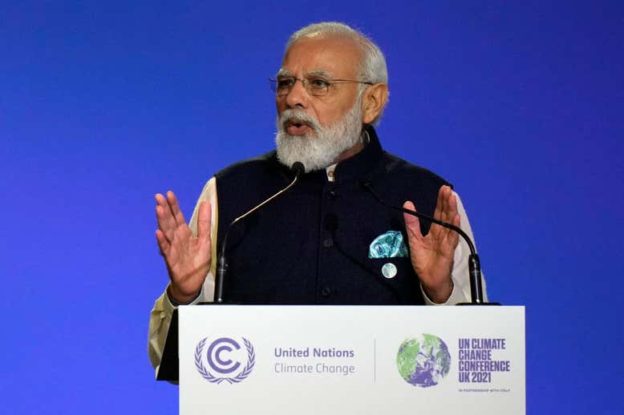On Wednesday, Minister of State for environment, Ashwini Choubey, responded to Rajya Sabha MP Sushil Modi on India’s required climate finance saying that the country expects developed countries to transfer $1 trillion annually to developing countries to meet their climate targets.
India will need approximately US $1 trillion in additional financing over the next ten years in order to meet the commitments made by Prime Minister Narendra Modi at the recently-concluded COP26 climate summit, the Rajya Sabha was told on Thursday.
On Wednesday, Minister of State for environment, Ashwini Choubey, responded to Rajya Sabha MP Sushil Modi on India’s required climate finance saying that the country expects developed countries to transfer $1 trillion annually to developing countries to meet their climate targets.
During the global event, Prime Minister Narendra Modi had announced that India’s non-fossil capacity will reach 500 GW, will meet 50 percent of its energy requirements with renewables, reduce its total projected carbon emissions by one billion tonnes and reduce carbon intensity by 45 percent till 2030. The PM also declared that India will attain net zero emissions by 2070.
Under the Paris Agreement which was adopted by signatory countries in 2015, India had submitted Nationally Determined Contribution (NDC) with quantified targets to reduce the emissions intensity of its Gross Domestic Product (GDP) by 33-35 per cent till 2030 from the levels at 2005, to achieve about 40 per cent cumulative electric power installed capacity from non-fossil fuel-based energy resources by 2030, and to create an additional carbon sink of 2.5-3 billion tonnes of carbon dioxide equivalent through additional forest and tree cover by 2030.
Developed countries had committed to a mobilisation goal of US $100 billion per year, by 2020. The Glasgow Climate Pact noted with deep regret that the goal of developed country parties has not yet been met. In this regard, the COP26 has requested the Standing Committee on Finance to the UNFCCC to prepare a report in 2022 on progress towards achieving the goal of mobilising the US $ 100 billion per year to address the needs of developing countries.
On Wednesday, Vaishnaw said that India’s climate actions have so far been largely financed by domestic resources. According to India’s Third Biennial Update Report (BUR) to the UNFCCC in February 2021, between 2014 and 2019, while the Global Environment Facility and Green Climate Fund has provided grants to a total of only US $165.25 million, the corresponding domestic mobilisation amounts to US$1.374 billion.
In this context, the government has undertaken the Perform Achieve and Trade (PAT) scheme, targeting carbon emission reduction in 13 energy intensive sectors, has permitted Foreign Direct Investment (FDI) up to 100 percent under the automatic route in the renewable energy sector, waived inter-state Transmission System (ISTS) charges for inter-State sale of solar and wind power for projects, has made a declaration of trajectory for Renewable Purchase Obligation (RPO) and set up Renewable Energy parks, apart from announcing the National Hydrogen Mission, said the ministry’s response.
India’s non-fossil fuel energy has increased by more than 25 per cent in the last seven years and it has reached 40 per cent of India’s energy mix, the response stated.
https://indianexpress.com/article/india/cop-26-narendra-modi-commitments-rajya-sabha-7653505/?action=profile_completion&





